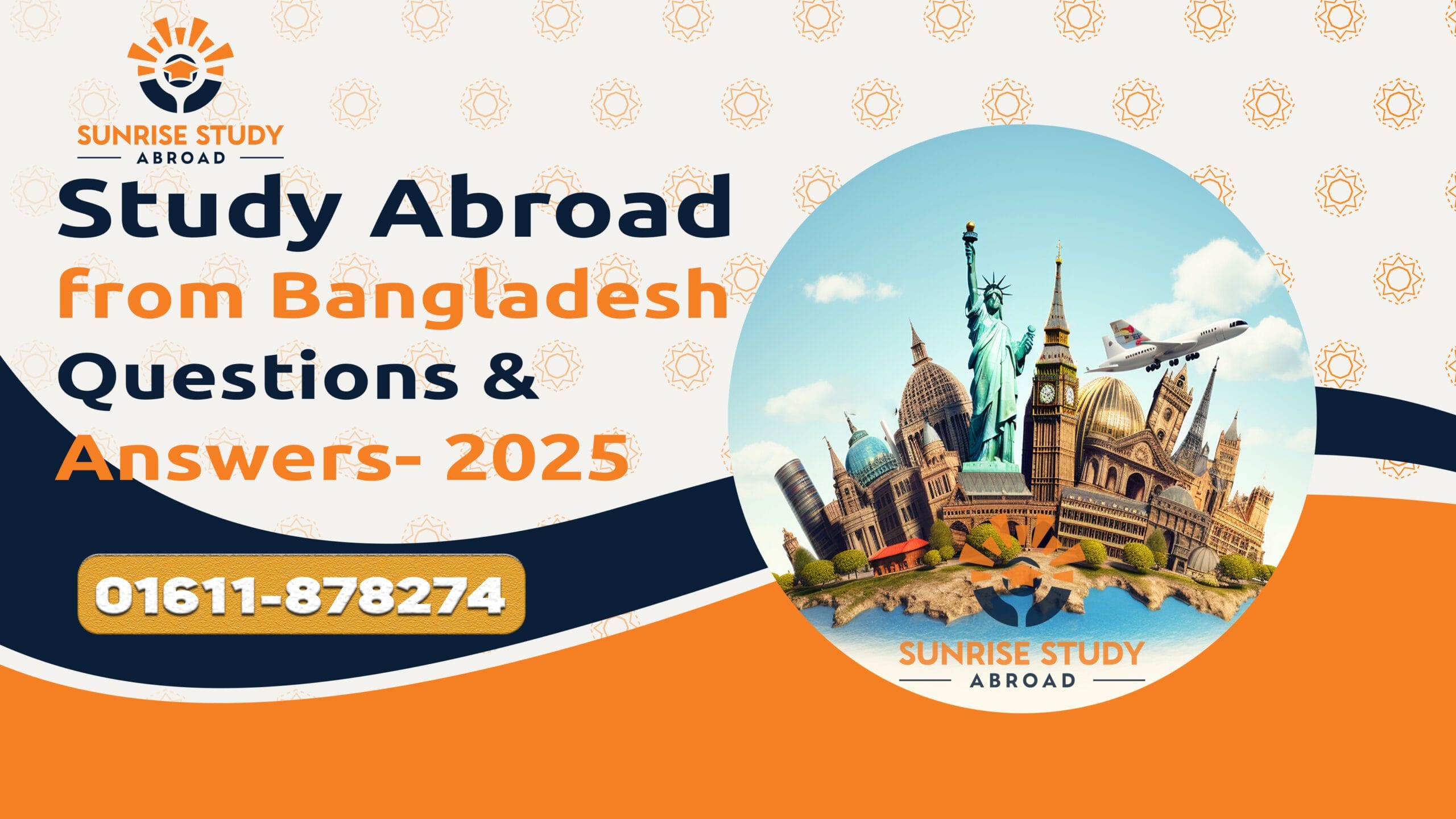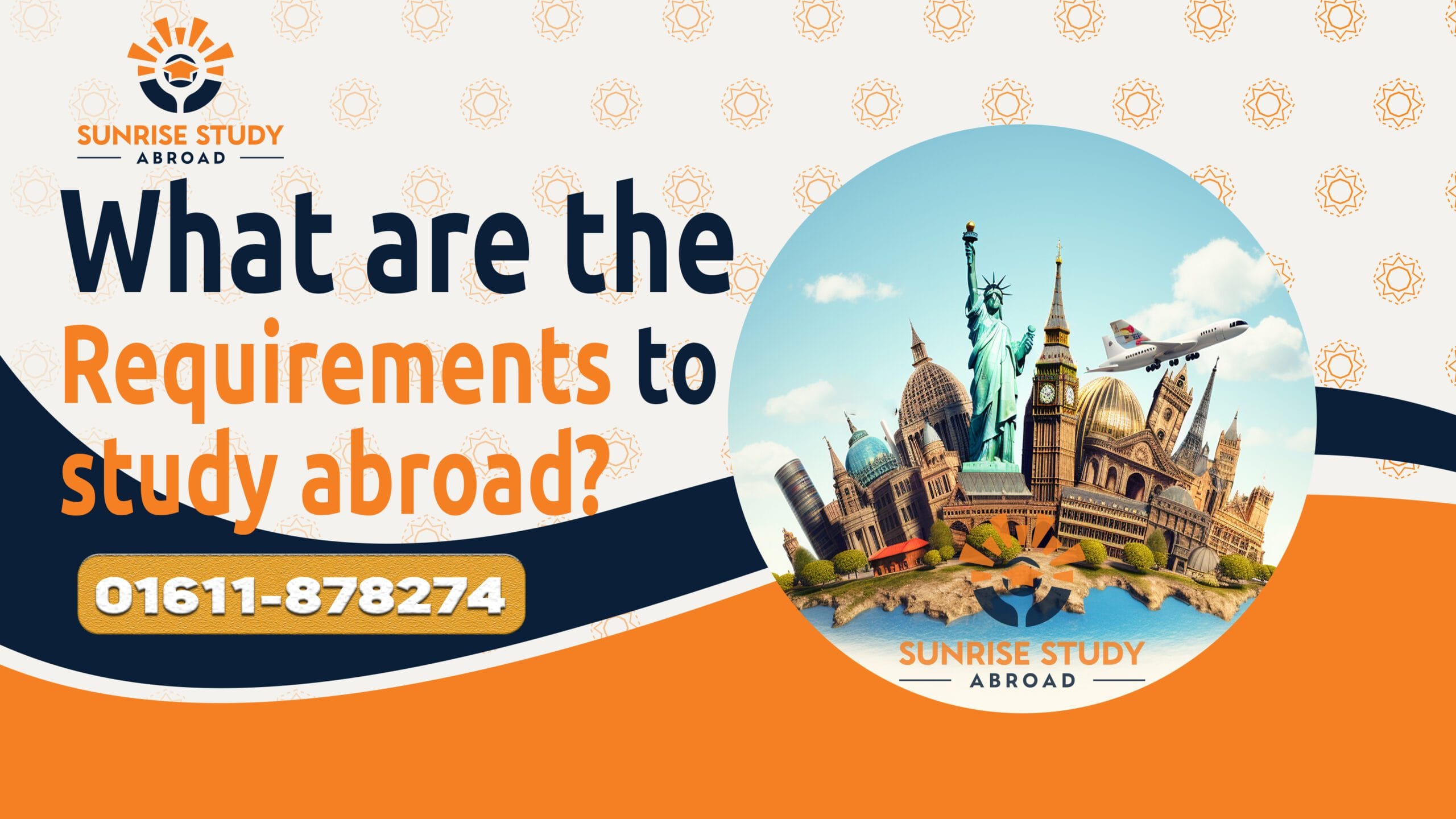Introduction: Study Abroad from Bangladesh: Questions and Answers- 2025. Studying abroad can be a life-changing opportunity, providing students with access to world-class education, diverse cultures, and valuable life experiences. For students in Bangladesh, the journey to study abroad might seem overwhelming, but with the right information and guidance, it’s entirely achievable. This guide answers common questions that Bangladeshi students have about studying abroad, covering everything from choosing the right country to visa applications and financial planning. Download this PDF to start your journey towards a global education today!
Why Should I Consider Studying Abroad?
Answer: Studying abroad offers numerous benefits, including exposure to international educational standards, the opportunity to network with students from around the world, and the chance to improve language skills. Employers often highly value international degrees, which can significantly enhance your career prospects. Additionally, living in a different country fosters personal growth and adaptability, essential skills in today’s globalized world.
What Are the Best Countries for Bangladeshi Students to Study Abroad?
Answer: Popular study destinations for Bangladeshi students include the United States, the United Kingdom, Canada, Australia, and Germany. Each country has its strengths. For instance:
- The USA: Known for a wide range of programs and cutting-edge research facilities.
- The UK: Offers shorter degree programs (e.g., three years for a bachelor’s degree) and high-ranking universities.
- Canada: Has affordable tuition rates and generous work permits post-graduation.
- Australia: Known for its diverse culture, great job opportunities, and top-ranked universities.
- Germany: Offers free or low-cost education in public universities with many English-taught programs.
Your choice should depend on your academic goals, budget, and career aspirations.
How Do I Choose the Right Program and University?
Answer: When selecting a program, consider your career goals and personal interests. Research universities based on the strength of their programs in your chosen field. Some factors to consider include:
- Accreditation and ranking: Look for universities recognized in your field.
- Location and cost of living: These affect your budget.
- Internship and research opportunities: Practical experience can be critical for your career.
- Alumni success stories: Review the career paths of past graduates. It can be helpful to attend educational fairs and speak with alumni or current students to get first-hand insights.
What Are the Basic Admission Requirements?
Answer: Admission requirements vary by country and university, but generally include:
- Educational Transcripts: Proof of previous academic achievements.
- Language Proficiency Tests: Most English-speaking countries require IELTS or TOEFL scores.
- Standardized Tests: For specific courses like SAT (for undergrad) or GRE/GMAT (for grad school).
- Statement of Purpose (SOP): An essay detailing your motivation and goals.
- Letters of Recommendation: Endorsements from previous teachers or employers.
- Additional Requirements: Some programs may require a portfolio, entrance exams, or interviews.
How Do I Apply for Scholarships?
Answer: Scholarships can significantly reduce the financial burden of studying abroad. Here are some tips for finding scholarships:
- Check University Websites: Many universities offer scholarships for international students.
- Government Scholarships: Some countries, like Canada and Germany, offer government-funded scholarships.
- Private Organizations: Various foundations and private organizations offer scholarships for students from Bangladesh.
- Prepare Early: Scholarship applications require time, so start preparing well in advance. Write a strong personal statement, gather your documents, and ensure your application is compelling.
What Is the Student Visa Application Process?
Answer: The visa application process depends on the country you’re applying to. Generally, you’ll need:
- Acceptance Letter: Proof of admission from your chosen institution.
- Financial Proof: Evidence that you can support yourself financially during your studies.
- Valid Passport: Ensure it is up-to-date and valid for the duration of your studies.
- Medical Examinations: Some countries require health checks or vaccinations.
- Language Proficiency Proof: Required for non-native English-speaking countries. Each country has different timelines and processes, so check embassy websites for updated information.
How Much Does Studying Abroad Cost?
Answer: The cost varies significantly by country, city, and institution. Generally, expenses include:
- Tuition Fees: Ranging from a few thousand dollars (in Germany) to over $30,000 (in the USA).
- Living Expenses: Covers accommodation, food, transportation, and other essentials.
- Health Insurance: Mandatory for students in many countries.
- Miscellaneous Fees: Includes study materials, social events, and travel costs. It’s crucial to budget and explore options like scholarships, part-time work, and student loans to manage costs effectively.
Can I Work While Studying Abroad?
Answer: Yes, most countries allow international students to work part-time. For instance:
- USA: Students can work on-campus up to 20 hours per week.
- UK: Allows up to 20 hours of work during term time.
- Canada: Students can work off-campus for up to 20 hours per week.
- Australia and Germany: Permit students to work up to 20 hours during the semester. Working part-time can help cover living expenses and gain valuable work experience, but ensure that work doesn’t interfere with your studies.
How Can I Adjust to Life in a New Country?
Answer: Adapting to a new country can be challenging, but it’s also exciting. Here are some tips:
- Join Student Groups: Many universities have cultural or interest-based groups for support.
- Stay Connected with Family: Regularly communicate with family and friends back home.
- Learn Local Customs: Understanding cultural norms can help you settle in faster.
- Explore Your Surroundings: Discover local attractions, cafes, and parks to feel more at home.
- Seek Support Services: Most universities have counseling and student support services if you need help.
What Happens After I Graduate?
Answer: After graduation, you may have several options:
- Post-Graduate Work Permits: Countries like Canada and Australia offer post-study work visas.
- Further Studies: Consider enrolling in a master’s or Ph.D. program.
- Return to Bangladesh: Use your degree and international experience to build a career back home.
- Permanent Residency: Some countries offer pathways to permanent residency for graduates. Each country has its policies, so research options based on your career goals.
Conclusion:
Studying abroad is an achievable dream for Bangladeshi students, and with careful planning, you can make it a reality. This guide provides foundational information, but remember to conduct further research based on your destination country and specific academic goals. Don’t hesitate to reach out to educational consultants or university advisors for personalized guidance. Good luck on your journey to a world-class education!



